Korean Literature in ?ialectical Transition Amid New Social Reality
Contributing Writer
SEOUL?orean literature has undergone rapid changes amid the political and social upheavals during the last decades.
In the l980s, when political issues were a main theme of Korean literary works, they often featured the labor class and students suffering from the dictatorship. Some of the progressive writers were detained, with their works subject to censorship.
But with the democratization in the l990s, the social or political engagement stopped serving as one of literary causes, with writers turning their eyes from politics and society to themselves and their private lives.
In the 2000s, the "introversion" still remains a dominant feature in literary works.
According to Choi Won-shik, a literary critic and managing director of Changbi, a representative literary magazine which advocated literature of social engagement, Korean literature is now seeking to explore new ways, or a dialectic point of contact between the "privatized" literature and society.
"There is a new move to map out ways to encounter society," Choi said, "among prominent writers such as Hwang Ji-woo and Hwang Suk-young," in particular.
"We used to know Hwang Ji-woo as the one who distanced himself from social engagement. But the poet published a play, ?worui Sinbu (May Bride), which sheds new light on the pro-democracy struggle in Kwangju in May l980. Given that the play is a literary genre that meets the audience face to face, it might be his effort to maximize the communication with society."
As a different move among the writers and social engagement, Choi cited the novelist Hwang Suk-young, one of the representative critics of the political establishment, who is now opting to detach himself from social and political affairs.
Hwang? recent ?raedoen Chongwon (An Old Garden), which is a sort of psychological novel told in the first person, is proof that he began to see society in an introspective manner.
For the younger generation of writers who mostly made their literary debuts in the l990s, however, literature still remains focused on their personal domains. Some critics express concern that this outlook "trivializes literature."
The "petty" aspect of their works, however, is an inevitable result of the demise of grand ideologies in the post-Cold War era, according to Choi.
"Their works represent the self-centered and trivialized urban life of present-day Korea, now devoid of ideological tension," he explained.
Another feature representing the changes in the social reality is the young writers imitation of Murakami Haruki? hard-boiled style to describe their dry and fragmented lives, Choi pointed out, adding that such a style appeals to younger readers.
Choi cited the works of Eun Hee-kyung and Youn Dae-noung as the most successful examples of setting such a style of storytelling as a literary trend.
Choi went on to expect that the "cursed attraction" of the city, as Baudelaire has said, would continue to occupy the minds of younger writers.
As to the strong impact of the Internet age on literature, meanwhile, Choi expressed more optimism than concerns.
"A German poet, Enzensberger, said something about ?igital Revelation and ?igital Gospels at the same time. Cyberspace can subordinate real space but, on the other hand, it can achieve ?eledemocracy by using its mutuality."
For writers, just like others, the digital era comes as a blessing, instead of a scourge, according to the literary critic. "If admitting that the Internet has become an indispensable part of life, it can be used as a means to be more interactive with readers.
"Actually, most Korean writers have been content with print media. They have also insisted one-way communication by assuming an authoritative position as information providers. In that respect, the digital technology might serve as an apt momentum for writers to rethink their roles and build a constructive solidarity with readers."
At the same time, the literary critic does not agree with the voices predicting a dismal fate for liberal arts under globalization, which judges everything by market value.
"Someone said that literature is always a venture. An overly affluent society cannot produce great literary works. In the l990s, we naturally expected our country to attain the same status as other developed countries. People focused on their private lives rather than on the society, and this was reflected in the literature. But after the financial crisis of l997, which subjugated the nation to the IMF trusteeship, they realized that individuals cannot remain independent from society and they started to seek a contact point between the two."
Considering this change in the social consciousness, it? about time to see a great literary achievement, Choi said.
"Nowadays, people face great economic challenges in the wake of the ?MF crisis and the political issue of national reunification. As a result, the public and writers alike started to rethink their social identities and collective fate."
The changes in the social consciousness, Choi expects, will lead to the revival of a discussion on a "grand design" in the literary circle, which in turn can give birth to a great, monumental work.
"Korean literature is now experiencing the Hegelian dialectic process. I expect that the literary circle will soon produce a masterpiece. I? waiting for it."
스마터리빙
more [ 건강]
[ 건강]이제 혈관 건강도 챙기자!
[현대해운]우리 눈에 보이지 않기 때문에 혈관 건강을 챙기는 것은 결코 쉽지 않은데요. 여러분은 혈관 건강을 유지하기 위해 어떤 노력을 하시나요?
 [ 건강]
[ 건강]내 몸이 건강해지는 과일궁합
 [ 라이프]
[ 라이프]벌레야 물럿거라! 천연 해충제 만들기
 [ 건강]
[ 건강]혈압 낮추는데 좋은 식품
[현대해운]혈관 건강은 주로 노화가 진행되면서 지켜야 할 문제라고 인식되어 왔습니다. 최근 생활 패턴과 식생활의 변화로 혈관의 노화 진행이 빨라지고
사람·사람들
more
[한인단체 신년 인터뷰] KYCC 송정호 관장… “지역사회 위한 종합 서비스 강화”
LA 한인타운 대표 비영리단체 한인타운청소년회관(KYCC)의 송정호 관장은 “지금 우리가 하는 일은 커뮤니티 ‘니즈’가 있기 때문에 존재한다”…

[한인단체 신년 인터뷰] LA 평통 장병우 회장… “본연 역할로 한반도 평화 실질 기여”
민주평화통일자문회의 LA협의회(이하 LA 평통) 장병우 회장은 6일 본보와의 신년 인터뷰에서 붉은 말의 해인 병오년 새해를 맞아 신년 화두로 …
워싱턴주에 첫 한인 시의장
워싱턴주에서 첫 한인 시의회 의장이 탄생했다. 제이슨 문(한국명 문태원) 머킬티오 시의원이 새해 들어 시의장으로 선출되며 또 하나의 중책을 맡…
국회 방문단 대한인국민회 방문
윤후덕·이해식·김한규 의원과 조오섭 국회의장 비서실장 등 10여 명의 한국 국회방문단이 지난 5일 LA를 찾아 로즈데일 묘지와 국민회관 등 미…
[한인단체 신년 인터뷰] 명원식 파바월드 회장… …
“한인 차세대들이 바르게 자랄 수 있는 토대를 만드는 것이 제가 파바월드의 회장으로 존재하는 유일한 이유입니다”한인사회의 대표적 청소년 봉사 …
많이 본 기사
- 트럼프 “對이란 강력 선택지 검토…이란서 협상하자고 연락와”
- 흔들리는 OPEC…트럼프, ‘세계 석유 지도’ 다시 그리나
- 법무부, ‘리모델링 의혹’ 연준에 소환장…파월 반발
- 尹 ‘평양 무인기 의혹’ 이적혐의 첫 재판…’기밀’ 비공개 진행
- ‘케데헌’, 골든글로브 애니메이션상·주제가상 2관왕
- 트럼프, 對이란 군사개입가능성 질문에 “강력한 선택지 검토중”
- 사우디에 트럼프골프장·호텔…트럼프 가족회사, 100억달러 사업
- 美, 남아공 해상 ‘브릭스 군사훈련’ 주시… “이익 지킬 것”
- 마두로 체포 특수작전이 부러운 中… “오랜 추구에도 한계”
- “러시아가 보호해주려나…” ‘그림자’ 유조선 美 피해 선적 변경
- 지원 마감된 대학 불안하다면… 1월15일 마감 대학들
- ‘김건희일가 양평 도로 의혹’ 국토부 서기관 재판 내달 시작
- 박나래 갑질 논란, 새 국면..前매니저 거짓말 정황→오열 녹취록
- 운이 가득한 2026년을 기원하며
- “재정보조는 확률로 성공하는 것이 아니다”
- ShakeAlert‘s Malfunction: A Call for Reliability
- 적수 없는 ‘세계 최강’ 안세영, 새해 첫 대회부터 3연패 ‘금자탑’
- 장동혁 “與공천헌금 특검법 야권 회동에 조국 대표도 동참하길”
- 구글-월마트 ‘AI 쇼핑’ 손잡아… “챗봇과 대화중 상품 결제 가능”
- 국토안보부, ‘시위 확산’ 미네소타에 법집행인력 추가 파견
- 미국은 ‘뇌’, 중국은 ‘몸’…체제가 된 AI
- 최백호, 핼쑥한 얼굴로 등장 “호흡기 병으로 15kg 빠져”
- 도피성출국 김경, 귀국 4시간만에 경찰로…강선우 1억의혹 조사
- 트럼프의 ‘흑역사 지우기’?…국립박물관서 잇달아 탄핵소추 삭제
- ‘날벼락’ 김혜성 WBC 사이판 가 있는데→LAD 갑작스러운 ‘경쟁자 2명 영입 확정’ 주전 경쟁 더 험난해지나
- FBI국장 “지난해 북중러 등 적국 스파이 체포, 전년比 35%↑”
- ‘돌돌싱’ 이지현, 두 아이와 韓 떠났다.. “미국에서 공부”
- 美 식이지침 포함된 김치… ‘마이크로바이옴’ 건강에 무슨 역할?
- 트럼프 “美가 베네수 보호…이젠 베네수→쿠바 석유·돈 안갈것”
- 대북대화 ‘바늘구멍’ 뚫던 중 변수 … 1
- 국토안보부, ‘시위 확산’ 미네소타에 법집행인력 추가 파견
- 이란 대통령 “美·이스라엘이 혼란 조장, 폭도가 사회 파괴”
- “트럼프의 그린란드 위협, 소련의 동맹 침공 역사 소환”
- 크리스 라이트 에너지장관 “베네수 석유산업 美개입 확대해 생산량 늘릴것”
- “트럼프, 이란 군사타격 선택지 보고받아…최종결정 고심중”
- 션, ♥정혜영 쏙 빼닮은 미모의 막내딸 공개.. “주위에서 배우시키라고 해”
- 이강인 주전 파란불 ‘경쟁자 한 명 떠난다’... 아스널, ‘PSG 특급 재능’ 바르콜라 영입 근접
- 이스라엘, 트럼프 대이란 군사작전 가능성에 경계태세 돌입
- 美방문 통상본부장 “쿠팡 문제, 통상·외교 이슈와 분리돼야”
- ‘中 절망’ 안세영 우승 막을 ‘유일 천적’, 이유도 모르는 ‘충격 기권’... “미리보는 결승이었는데”
- 이란 시위 사망자 폭증… “2천명 넘게 숨졌을 가능성도”
- 美, ‘中드론’ 제한조치 철회… “4월 미중회담 앞두고 긴장완화”
- 작년 한국의 1인당 GDP 3만6천달러 턱걸이한 듯…3년 만에 뒷걸음
- 장원영 웃고 안성재 울린 ‘두쫀쿠’ 열풍..뭐길래?
- 송혜교, 한 해의 시작에서.. “마지막 출근”
- 피겨 차준환 “장비·발목 문제 수습…올림픽서 감동 무대 선사”
- [CES 결산] 화면 넘어 일상으로…실물AI가 열어젖힌 로봇·자율주행 시대
- 머스크 “X 알고리즘 일주일뒤 전면 공개…4주마다 업데이트”
- 美, 미군 공격한 시리아 IS에 대규모 보복 공습
- ‘ICE총격’에 주말 미 전역 시위…… 2
1/5지식톡

-
 미 육군 사관학교 West Poin…
0
미 육군 사관학교 West Poin…
0https://youtu.be/SxD8cEhNV6Q연락처:wpkapca@gmail.comJohn Choi: 714-716-6414West Point 합격증을 받으셨나요?미 육군사관학교 West Point 학부모 모…
-
 ☝️해외에서도 가능한 한국어 선생님…
0
☝️해외에서도 가능한 한국어 선생님…
0이 영상 하나면 충분합니다!♥️상담신청문의♥️☝️ 문의 폭주로 '선착순 상담'만 진행합니다.☎️ : 02-6213-9094✨카카오톡ID : @GOODEDU77 (@골뱅이 꼭 붙여주셔야합니다…
-
 테슬라 자동차 시트커버 장착
0
테슬라 자동차 시트커버 장착
0테슬라 시트커버, 사놓고 아직 못 씌우셨죠?장착이 생각보다 쉽지 않습니다.20년 경력 전문가에게 맡기세요 — 깔끔하고 딱 맞게 장착해드립니다!장착비용:앞좌석: $40뒷좌석: $60앞·뒷좌석 …
-
 식당용 부탄가스
0
식당용 부탄가스
0식당용 부탄가스 홀세일 합니다 로스앤젤레스 다운타운 픽업 가능 안녕 하세요?강아지 & 고양이 모든 애완동물 / 반려동물 식품 & 모든 애완동물/반려동물 관련 제품들 전문적으로 홀세일/취급하는 회사 입니다 100% …
-
 ACSL 국제 컴퓨터 과학 대회, …
0
ACSL 국제 컴퓨터 과학 대회, …
0웹사이트 : www.eduspot.co.kr 카카오톡 상담하기 : https://pf.kakao.com/_BEQWxb블로그 : https://blog.naver.com/eduspotmain안녕하세요, 에듀스팟입니다…
케이타운 1번가
오피니언

무분별 이민 단속이 불러온 비극

무면허 건축업자 피해 근절돼야
 메건 매카들 워싱턴포스트 칼럼니스트
메건 매카들 워싱턴포스트 칼럼니스트 [메건 매카들 칼럼] 마두로는 체포했지만… 베네수엘라 석유 생산 회복은?
 김미선 서북미문인협회 회장시인
김미선 서북미문인협회 회장시인 [한국춘추] 새해, 북방의 한국인을 생각하며
 김인자 시인·수필가
김인자 시인·수필가 [금요단상] 2026년을 맞이하며
 최형욱 / 서울경제 논설위원
최형욱 / 서울경제 논설위원 [만화경] 선거용 볼모 된 새만금
 최호근 / 고려대 사학과 교수
최호근 / 고려대 사학과 교수 [역사속 하루] 1938년 1월 3일 소아마비극복재단 출범
 이상희 UC 리버사이드 교수 인류학
이상희 UC 리버사이드 교수 인류학 오렌지 상자와 함께하는 2026년
 오세정 서울대 물리천문학부 명예교수·전 총장
오세정 서울대 물리천문학부 명예교수·전 총장 [오세정 칼럼] 병오년 새해, 한국의 과제
1/3지사별 뉴스

“2세 아동도 무상교육”⋯ 맘다니 1호 무상정책 시동
뉴욕시가 앞으로 모든 2세 아동을 대상으로 무상 보육을 제공키로 했다.부자 증세, 임대료 동결, 무상 보육, 무상 버스 등의 공약으로 돌풍을 …
연방하원, 오바마케어 보조확대 3년 연장안 통과

워싱턴 지역 ‘연방정부 일자리’ 7만2천여개 사라져
지난해 워싱턴 지역에서 총 7만2천개 이상의 연방정부 관련 일자리가 없어진 것으로 나타났다.연방 노동통계국(BLS)이 7일 발표한 실업률 자료…
오바마케어 보험료 납부 ‘대혼란’

국토안보부, ‘시위 확산’ 미네소타에 법집행인력 추가 파견
미네소타주 미니애폴리스에서 이민세관단속국(ICE) 요원의 민간인 총격 사망 사건이 발생한 이후 주요 도시에서 반발 시위가 확산하는 가운데 국토…
살림으로 뿌리내리다- 테이크루트 안미정 대표의 요리 이야기 (9)





























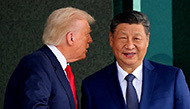




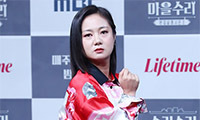
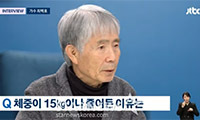
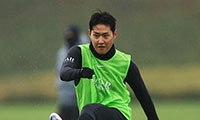
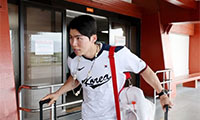













.png)


댓글 안에 당신의 성숙함도 담아 주세요.
'오늘의 한마디'는 기사에 대하여 자신의 생각을 말하고 남의 생각을 들으며 서로 다양한 의견을 나누는 공간입니다. 그러나 간혹 불건전한 내용을 올리시는 분들이 계셔서 건전한 인터넷문화 정착을 위해 아래와 같은 운영원칙을 적용합니다.
자체 모니터링을 통해 아래에 해당하는 내용이 포함된 댓글이 발견되면 예고없이 삭제 조치를 하겠습니다.
불건전한 댓글을 올리거나, 이름에 비속어 및 상대방의 불쾌감을 주는 단어를 사용, 유명인 또는 특정 일반인을 사칭하는 경우 이용에 대한 차단 제재를 받을 수 있습니다. 차단될 경우, 일주일간 댓글을 달수 없게 됩니다.
명예훼손, 개인정보 유출, 욕설 등 법률에 위반되는 댓글은 관계 법령에 의거 민형사상 처벌을 받을 수 있으니 이용에 주의를 부탁드립니다.
Close
x